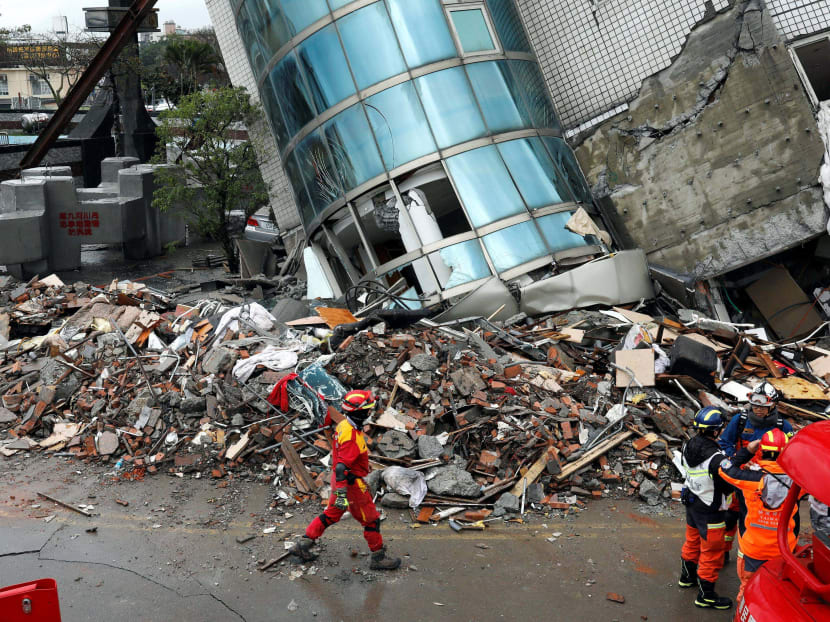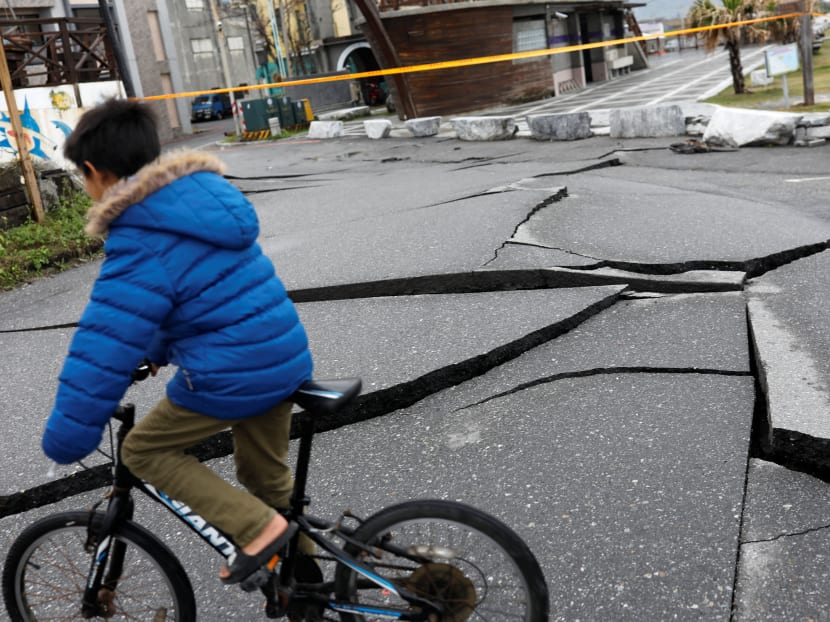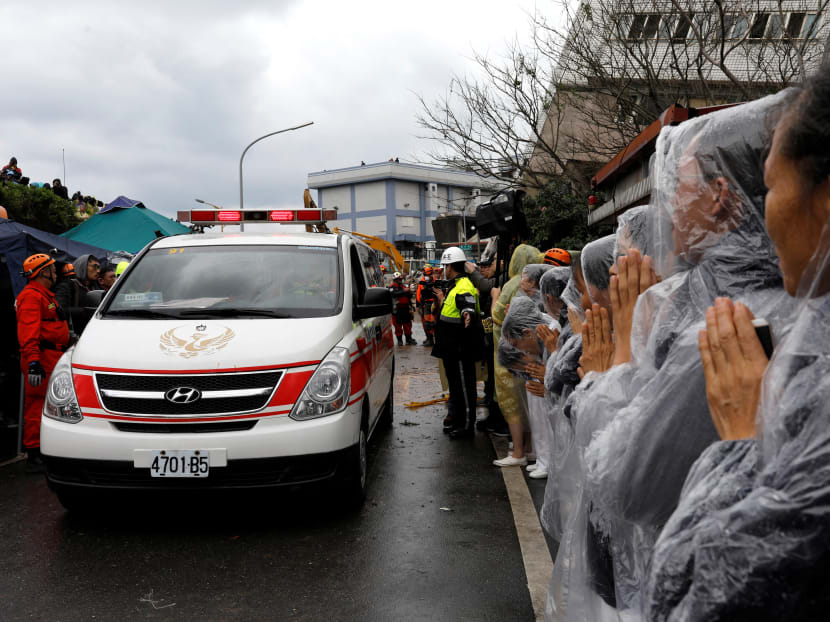Taipei rejects Beijing’s offer of help with earthquake rescue mission
HONG KONG — Taiwan has turned down an offer from Beijing to send a rescue team to the island after a powerful earthquake hit the coastal city of Hualien on Tuesday (Feb 6), killing at least ten people and injuring more than 250.

A rescuer walks outside a collapsed building after an earthquake hit Hualien, Taiwan. The self-ruled island Taiwan has turned down an offer from Beijing to send a rescue team to help with search and rescue work. Photo: Reuters
HONG KONG — Taiwan has turned down an offer from Beijing to send a rescue team to the island after a powerful earthquake hit the coastal city of Hualien on Tuesday (Feb 6), killing at least ten people and injuring more than 250.
Scores of aftershocks hampered rescue efforts as emergency personnel combed through collapsed buildings in search of survivors.
The magnitude 6.4 quake struck just before midnight that also injured 265 people. Four buildings collapsed, officials said, and about 58 people were still missing, while roads and bridges were damaged.
Taiwan’s Mainland Affairs Council told the South China Morning Post it appreciated the offer of help — seen as an olive branch from Beijing at a tense time for cross-strait relations — but it had enough manpower and resources.
“At the moment, we have adequate manpower and facilities in support of the rescue operation,” said Mr Chiu Chui-cheng, vice-chairman of the council, which takes care of mainland policy.
“We deeply appreciate their offer, but so far we are not in need of their help.”
Asked if this was a missed opportunity to break the ice with Beijing, Mr Chiu said: “Basically it is a natural disaster and the rescue involves humanitarian efforts. They shouldn’t be used as (a bridge) for political connection.”
The council later issued a statement saying it did not need any external help with the rescue efforts.
Mr Zhang Zhijun, director of the mainland’s Taiwan Affairs Office, earlier said Beijing was “willing to send a rescue team to Taiwan” to help with relief efforts as “compatriots of the two sides are a family”.
China's Xinhua news agency said that Mr Zhang had received details about the situation on the ground in a phone call with Fu Kun-Chi, head of Hualien County.
"Mr Zhang expressed deep sympathy to all the victims and sincere regards to Taiwan compatriots who suffered, saying that people from the mainland were deeply concerned about the earthquake and sympathised with their Taiwan compatriots," Xinhua added.
China's relief offer was also made by former Chinese Commerce Minister Chen Deming, who is president of the mainland-based Association for Relations Across the Taiwan Strait, while the Red Cross Society of China said it will provide 1 million yuan (S$210,251) for rescue operations, adding that it was also ready to send rescue teams to Taiwan.
Cross-strait relations turned sour when Taiwanese President Tsai Ing-wen refused to accept the “one-China” principle after she took office in May 2016.
Beijing suspended cross-strait talks and exchanges with Taiwan, which it considers to be a breakaway province.
Relations took a turn for the worst in recent weeks, with both sides trading accusations after two Chinese airlines cancelled extra flights to the self-ruled island over the Lunar New Year, the most important holiday in the Chinese calendar, potentially leaving thousands of Taiwanese without tickets to go home.
The move comes after China opened several new air routes in January, including a northbound route up the sensitive Taiwan Strait that divides China from the island. Taiwan says it was done without its agreement, contravening what the democratic government in Taipei has said was a 2015 deal to first discuss such flight paths.
Seeking to alleviate worries about stranded holidaymakers, Taiwan's China policy-making Mainland Affairs Council said on Tuesday there were already 418 extra flights added for the holidays in addition to 586 regularly scheduled flights, serving 50 Chinese destinations.
Professor Wang Kung-yi, a political science expert at Chinese Culture University in Taipei, said it was understandable Taipei would reject the offer of help given that the two sides were at loggerheads over Beijing’s launch of a new flight route, M503, which Taipei says is a security and safety risk.
“The Tsai government is unlikely to do anything that might be seen as a compromise over the dispute, such as agreeing for Beijing to send a rescue team to Taiwan,” Prof Wang said.
“Besides, the authorities can cope with a disaster of this scale, which is relatively small compared with the devastating earthquake that killed more than 2,000 people in Taiwan in September 1999.”

A child rides a bicycle on a fractured road after an earthquake hit Hualien. Photo: Reuters
Still, nervous Hualien residents endured more than 200 aftershocks, including a 5.7 quake late on Wednesday and smaller tremors early on Thursday.
Aftershocks with a magnitude of at least 5.0 could rock the island over the next two weeks, the government said.
“There were constant aftershocks so I didn’t really dare stay at home. The area around my house is actually not that bad, the houses are all OK but, because of the aftershocks, I don’t really want to stay there,” said Mr Yang Yantin.
A Reuters witness said people rushed out of a residential building and rescue workers looked up from piles of debris after another strong aftershock rattled the city at around 11am on Thursday.
Horns sounded to warn people to leave buildings and chanting from groups of Buddhists could also be heard.

Volunteers pray as a dead body is transferred by ambulance from a collapsed building after an earthquake hit Hualien. Photo: Reuters
It was initially feared as many as 150 people may have been missing in the rubble.
Many of the missing were believed to be trapped in a 12-storey residential building that was tilting at a 45-degree angle. Tenants and their furniture were flung across their apartments in the damaged building.
More than 600 soldiers and 1,300 police have been deployed to help with rescue efforts. The government said three mainland Chinese were among the dead.
Rescue workers used ladders and flash lights as they searched for survivors among the rubble on Thursday.
More than 800 people sought refuge in shelters overnight, many too scared to stay in their homes as aftershocks stirred panic.
Hualien is home to about 100,000 people. Its streets were buckled by the force of the quake, with large cracks along major roads.
“I’ve never actually experienced an earthquake before but I’d heard people say that there were often earthquakes here, so at first I didn’t really react, but later when all the lights started smashing — the floor was covered in glass — that is when I realised it was really serious,” said tourist Zhang Hongcong.
Taiwan, a self-ruled island that China considers part of its territory, lies near the junction of two tectonic plates and is prone to earthquakes.
More than 100 people were killed in a quake in southern Taiwan in 2016, and some Taiwanese remain scarred by a 7.6 magnitude quake that was felt across the island and killed more than 2,000 people in 1999. AGENCIES






